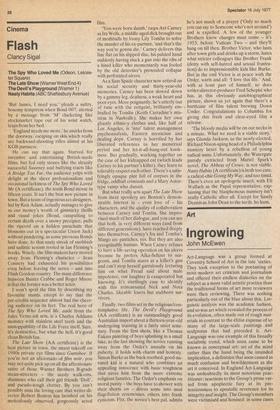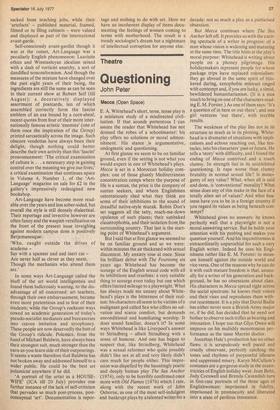Art
Ingrowing
John McEwen
Art-Language was a group formed at Coventry School of Art in the late 'sixties. They took exception to the poetasting of most modern art criticism and journalism and offered their endless dialectics on the subject as a more valid artistic practice than the traditional forms of art most reviewers were then reviewing. There was nothing particularly out of the blue about this. Linguistic analysis was the academic fashion, and so was art which revealed the process of its evolution, often made out of rough materials in contrast to the elitist expense of so many of the large-scale paintings and sculptures that had preceded it. ArtLanguage was one example of this broadly socialistic trend, which soon came to be known as conceptual art: art of the mind rather than the hand being the intended implication, a definition that soon caused as much confusion and bewilderment as the art it conceived. In England Art-Language was undoubtedly its most notorious practitioner: reactions to the Group's prose varied from apoplectic fury at its pretentiousness to apostolic reverence for its integrity and insight. The Group's members were victimised and lionised: in sonic cases
sacked from teaching jobs, while their 'artefacts' — published material, framed, filmed or in filing cabinets — were valued and displayed as part of the international avant-garde.
Self-consciously avant-gardist though it was at the outset, Art-Language was a peculiarly English phenomenon: Leavisite ethics and Winstanleyan idealism mixed with a dash of vorticist anarchy, a sort of dandified nonconformism. And though the measures of the mixture have changed over the past eight years of their being, the ingredients are still the same as can be seen in their current show at Robert Self (till August): a decoratively displayed assortment of postcards, ten of which assembled correctly form the fascist emblem of an axe bound by a corn-sheaf, recent quotes from four of their more internationally famous artistic 'enemies' (one of them once the inspiration of the Group) printed sarcastically across the image. Such obscure vendettas have always been their delight, though nothing could better describe their own activity than this 'fascist' pronouncement: `The critical examination of culture is . a necessary step in gaining control over the meaning we give our lives;' a critical examination that continues apace in Volume 4, Number 1, of the 'ArtLanguage' magazine on sale for £2 in the gallery's impressively redesigned new bookshop.
Art-Language have become more readable over the years and less sober-sided, but overall the style is still densely dialectical. Their reportage and invectiVe however are often funny and the waspish versification on the front of the present issue inveighing against modern campus dons is positively Betjemanesque: 'Who, caught outside the drives of academe — Say with a spanner and and inert car — Are never half as clever as they seem, Though the mechanics who attend them are.'
In some ways Art-Language called the bluff of the art world intelligentsia and found them ludicrously wanting, to the disadvantage of all concerned: art teachers, through their own embarrassment, became even more pretentious and in fear of their students; while the Group's cocksure ways cowed an academic generation of today's pseudo-socialist mediators and bureaucrats into craven imitation and sycophancy. These people are now deservedly the butt of the Group's ridicule. Polemics, from the hand of Michael Baldwin, have always been their strongest suit, much stronger than the earn-as-you-learn side of their outpourings. It seems a waste therefore that Baldwin has not broken away and addressed himself to a wider public. He could be the best art polemicist anywhere if he did.
'A portrait of the artist as a HOUSEWIFE' (ICA till 20 July) provides one further instance of the lack of self-criticism that pervades so much post-process, postconceptual 'art'. Documentation is repor
tage and nothing to do with art. Here we have an incoherent display of items documenting the feelings of women coming to terms with motherhood. The result is a trendy sociologist's dream but a nightmare of intellectual corruption for anyone else.



































 Previous page
Previous page